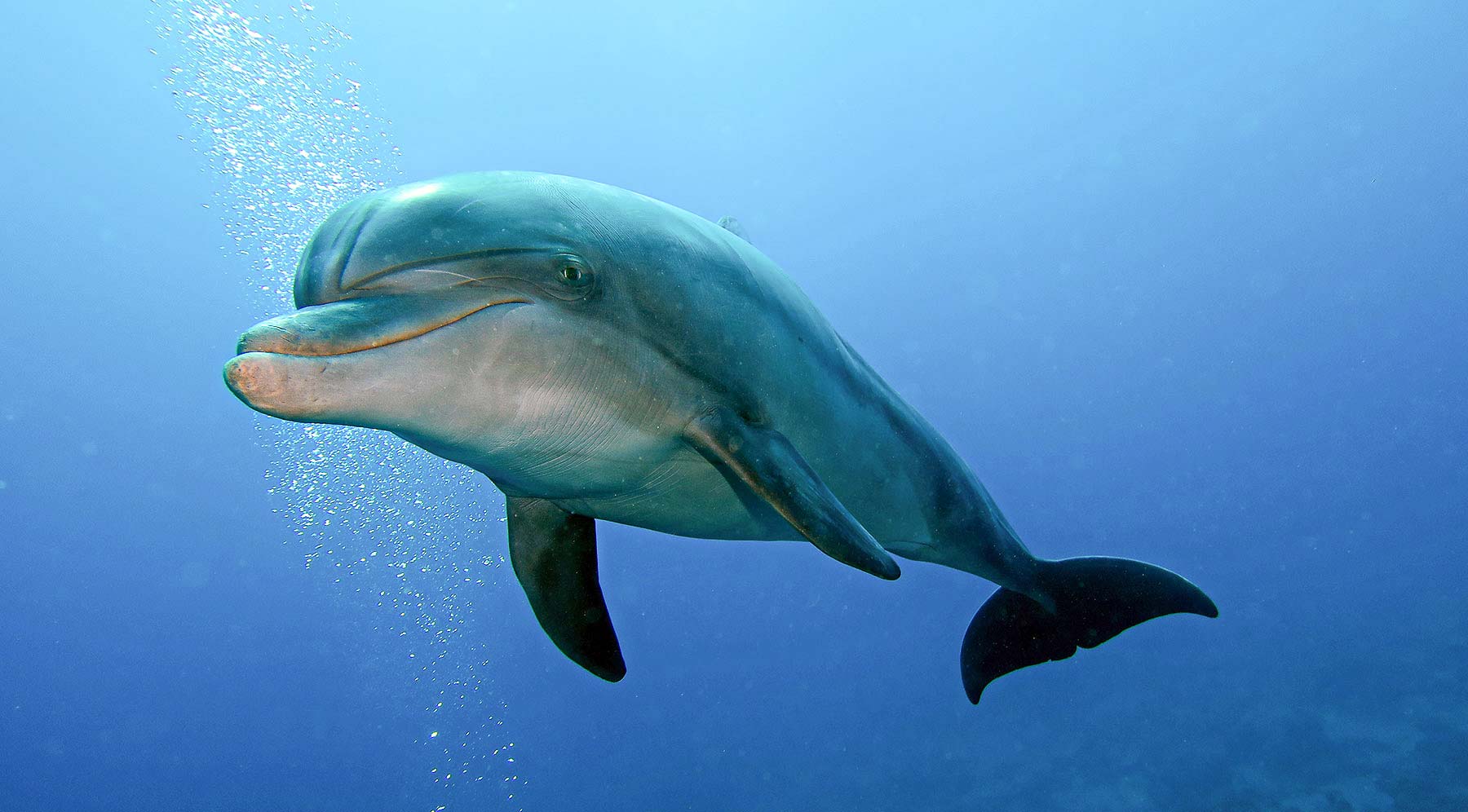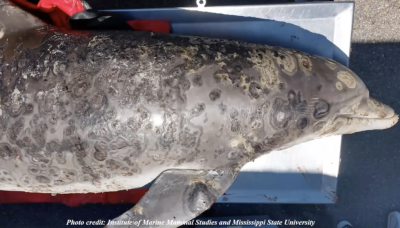Mississippi Sound Coalition Fires Back at U.S. Army Corps of Engineers in Dolphin Lawsuit

To download documents and other assets supporting this release, visit this Dropbox Link.
GULFPORT, Miss., April 24, 2024 – “Mississippi’s bottlenose dolphins are the ‘canaries in the coal mine.’ They’re our sentinels warning that all life is threatened by our government’s mismanagement of the Mississippi River,” said Gerald Blessey, General Counsel and Manager of the Mississippi Sound Coalition.
On Monday, Harrison County, Mississippi and the Cities of Biloxi, D’iberville, Pass Christian, the Mississippi Hotel and Lodging Association and Mississippi Commercial Fisheries United, Inc. filed an official response to the U.S. Army Corps of Engineers’ (Corps) motion to dismiss the Coalition’s Complaint vs. the Corps.
The lawsuit is for Declaratory and Injunctive Relief with the U.S. District Court for the Southern District of Mississippi under the Marine Mammal Protection Act to protect the Mississippi Sound and its dolphin population from further harm from polluted, low-salinity Mississippi River water entering the Sound via the Bonnet Carré Spillway.
 The Coalition filed the complaint earlier this year, triggering a motion to dismiss from the Corps. The original complaint states that massive volumes of Mississippi River water released through the Bonnet Carré Spillway and into the Mississippi Sound in 2019 caused direct and indirect mortality of many resident bottlenose dolphins and that the Corps is required under the Marine Mammal Protection Act to obtain a permit for these incidental “takes” of bottlenose dolphins. The dolphins’ long exposure to low salinity can result in skin lesions (and extraordinary pain), abnormal blood chemistry, secondary infections and death.
The Coalition filed the complaint earlier this year, triggering a motion to dismiss from the Corps. The original complaint states that massive volumes of Mississippi River water released through the Bonnet Carré Spillway and into the Mississippi Sound in 2019 caused direct and indirect mortality of many resident bottlenose dolphins and that the Corps is required under the Marine Mammal Protection Act to obtain a permit for these incidental “takes” of bottlenose dolphins. The dolphins’ long exposure to low salinity can result in skin lesions (and extraordinary pain), abnormal blood chemistry, secondary infections and death.
“The Corps basically argues that the factual statements of injury in the complaint are insufficiently specific,” said Robert Wiygul, Lead Environmental Counsel. “The declarations submitted with this response clearly establish injury that actually occurred and is substantially likely to occur again in the future.”
The group’s response to the Corps motion to dismiss includes a 30-page response along with six individual supporting declarations from: Dr. Moby Solangi, Executive Director of the Institute of Marine Mammal Studies; Mayor A.M. (Fofo) Gilich, City of Biloxi; Marlin Ladner, President, Harrison County Board of Supervisors; Capt. Louis Skrmetta, President and Chief Operating Officer of Pan Isles (Ship Island Excursions); Linda Hornsby, Executive Director, the Mississippi Hotel & Lodging Association; and Frank Parker, a sixth-generation commercial fisherman and member of Mississippi Commercial Fisheries United. See THIS LINK for the full text of their statements.
Statistics from the National Oceanographic and Atmospheric Administration (NOAA) and cited in the Complaint show that the highest recorded numbers of dolphin strandings in the Mississippi Sound occurred in 2011 and 2019. These two years were major flood years on the Mississippi River that resulted in extremely high discharges through the Bonnet Carré Spillway. These strandings were designated by NOAA as “unusual mortality events,” defined under the Marine Mammal Protection Act as “a stranding that is unexpected; involves a significant die-off of any marine mammal population; and demands immediate response.”
“The bottlenose dolphin is Mississippi’s state marine mammal and is one of the iconic creatures living within the County’s territorial limits in the Mississippi Sound, Bay of Biloxi, and Bay St. Louis,” said Dr. Solangi. “During the periods when the Bonnet Carré Spillway was open in 2019, there were 142 sick or dead bottlenose dolphins stranded on the waterfront within Mississippi and another 101 were stranded in the 2011 opening.
“Dolphins are long-lived species and have an average age of 20-25 years, with some living up to 50-years and beyond,” said Dr. Solangi. “Therefore, extensive mortality in various age classes can significantly affect the duration in which the population can recover from such events. It could take many years to restore a population after an episode such as 2011 or 2019.”
As stated in the original complaint, “These stranded dolphins in Mississippi had an extremely high incidence of lesions caused by extended freshwater exposure,” and, “the number of stranded dolphins documented in Mississippi as exhibiting these shocking lesions was approximately 50% of the total, as compared to approximately 10% in Alabama and 7% in Florida,” further evidence that the closer the dolphins were to the so-called fresh water, the more they were affected.
“One of the things our passengers love most is watching bottlenose dolphins in the Mississippi Sound,” said Capt. Skrmetta. “During the one-hour trip, we almost always see bottlenose dolphins, and they often swim and jump in the wake of our ferries, and our passengers love it. During the 2019 opening of the Bonnet Carré Spillway, multiple dead dolphins washed up on Ship Island. This is bad for visitors and bad for Pan Isles as a company.”
To recap the lawsuit, MSSC is asking for the federal court to 1) declare that the Corps has acted contrary to law and/or has unlawfully withheld or unreasonably delayed agency action in taking bottlenose dolphins through the operation of the Bonnet Carré Spillway and failing to obtain an incidental take permit; 2) order the Corps to fully comply with the requirements of the Marine Mammal Protection Act; 3) require the Corps to take action to avoid taking of bottlenose dolphins through operation of the Bonnet Carré Spillway; 4) award the plaintiffs their attorneys’ fees and costs as required by applicable rules and statutes; and 5) award such other and further relief as is proper.
The Coalition contends that the Corps could accomplish its mission of flood control for public safety of persons and property without doing harm to the Mississippi Sound estuary.
For more information about the Mississippi Sound Coalition, visit: SaveOurSoundMS.org
About Mississippi Sound Coalition (MSSC)
The Mississippi Sound Coalition (MSSC) desires to restore and protect the Mississippi Sound estuary and the economy and way of life that depend on it. Its efforts are focused on causing changes in public policies at national, state and local levels to prevent further damage from the polluted water of the Mississippi River that is released periodically by the U.S. Army Corps of Engineers from the Bonnet Carré Spillway in Louisiana and intrudes into the Mississippi Sound. MSSC also focuses on other threats to the Sound such as the Mid-Breton Sediment Diversion project, also in Louisiana. The Coalition provides public education on the subject, and, if necessary, engages in litigation. Members of the Coalition include Harrison County, Hancock County, the Mississippi cities of Biloxi, D’Iberville, Gulfport, Long Beach, Pass Christian, Diamondhead, Bay St. Louis, Waveland, Ocean Springs, Gautier, Pascagoula, the Mississippi Hotel & Lodging Association, and the Mississippi Commercial Fisheries United.
Please see our Litigation and Resources page for more information.